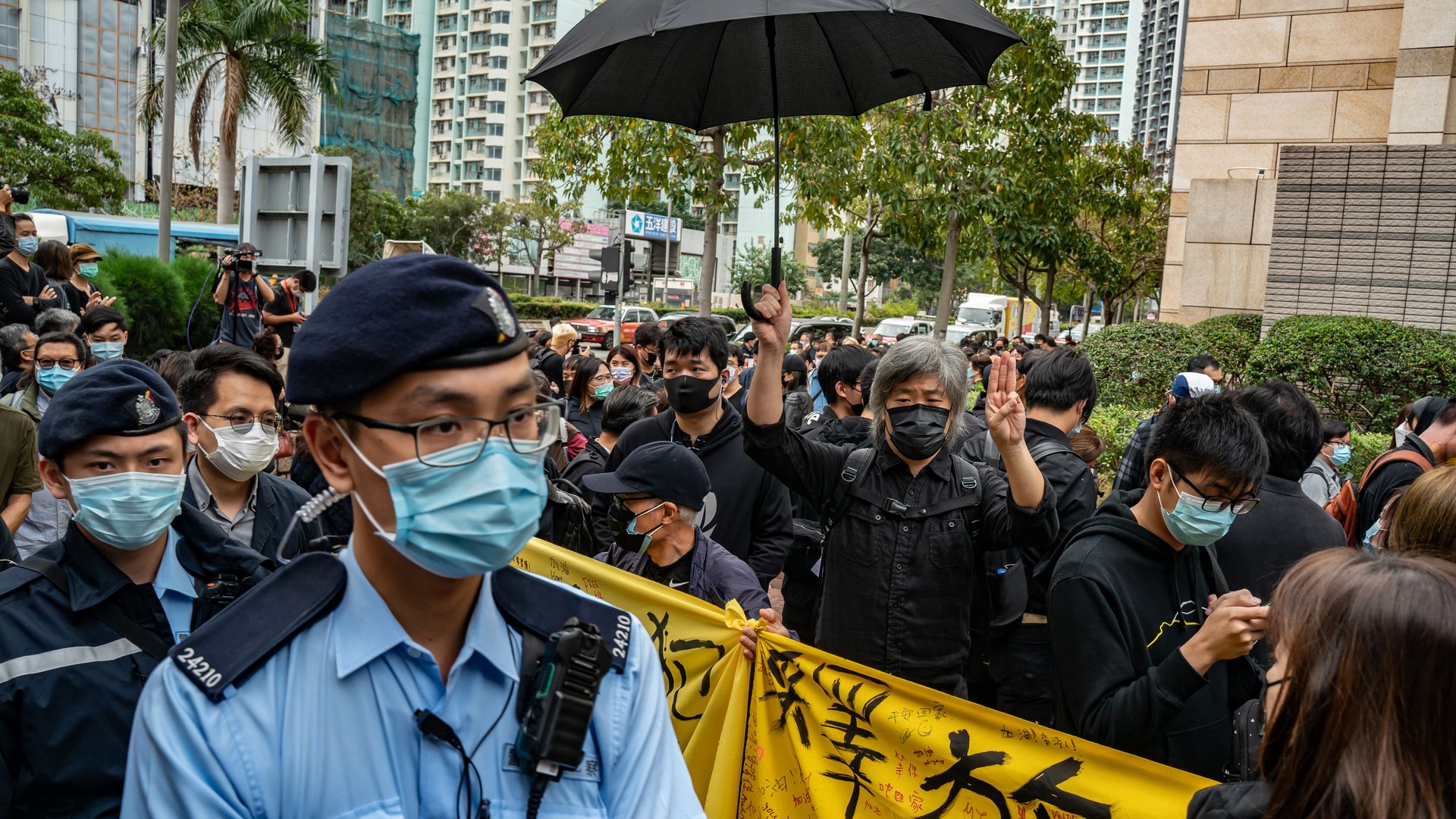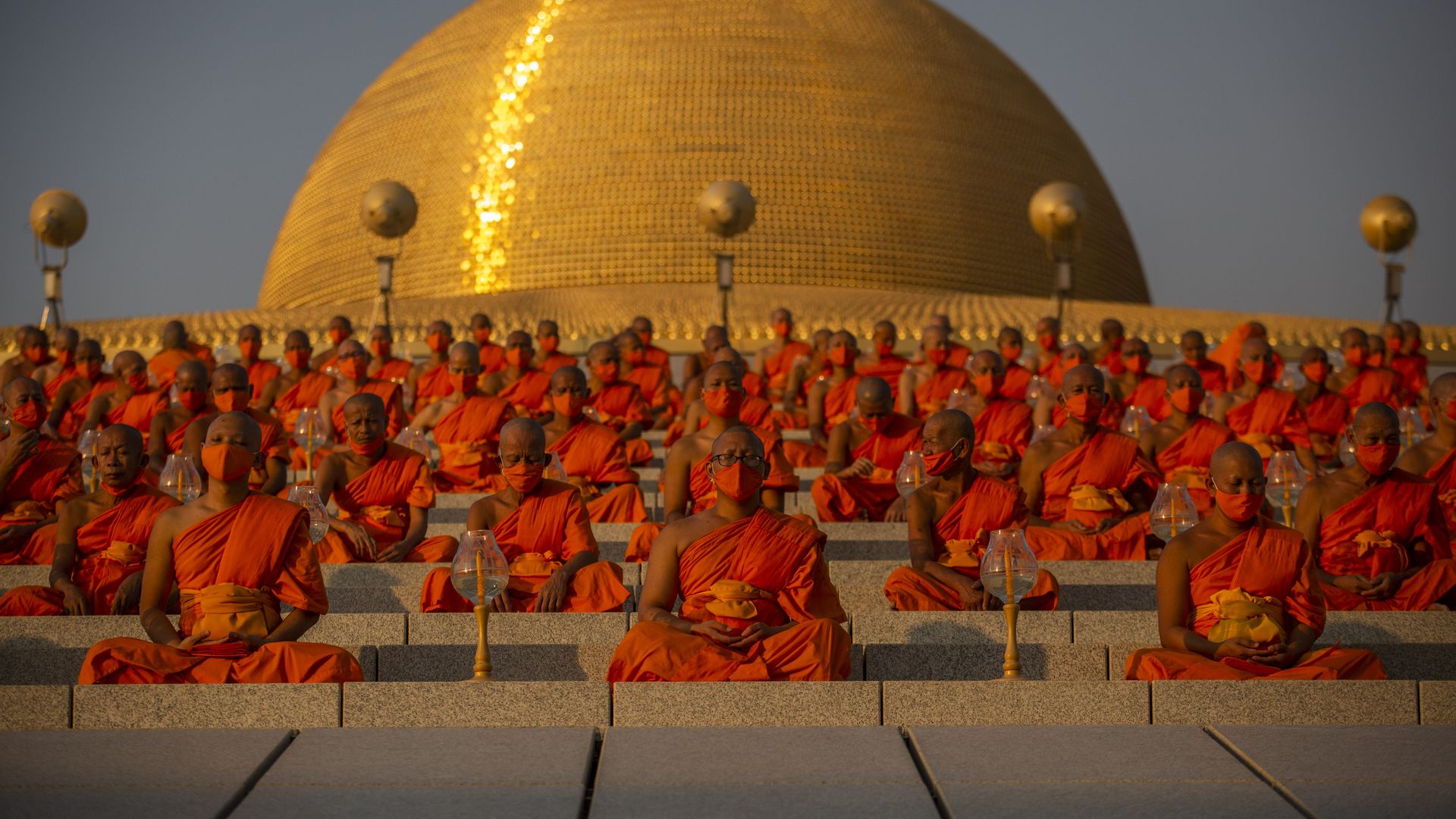| | | | | | | Presented By Babbel | | | | Axios World | | By Dave Lawler ·Mar 01, 2021 | | Welcome back to Axios World. - We're spending most of tonight's edition (1,575 words, 6 minutes) in the Americas, looking at vaccine supplies from China and Russia.
- Thanks for being a reader. Please tell a friend to sign up.
| | | | | | 1 big thing: Chinese and Russian vaccines spread across the Americas |  Several countries in the Americas have received their first vaccine shipments over the past few weeks — not from the regional superpower or from Western pharmaceutical giants, but from China, Russia, and in some cases India. Why it matters: North and South America have been battered by the pandemic and recorded several of the world's highest death tolls. Few countries other than the U.S. have the capacity to manufacture vaccines at scale, and most lack the resources to buy their way to the front of the line for imports. That's led to a scramble for whatever supply is available. - Only Chile (17%), the U.S. (15%), Barbados (12%), Canada (3%), Brazil (3%), Argentina (2%), Mexico (2%), Costa Rica (1%) and Panama have managed to provide a first dose to at least 1% of their populations.
Driving the news: Mexican President Andrés Manuel López Obrador — who has railed against vaccine "hoarding" by rich countries — was expected to ask President Biden in their virtual meeting tonight to share a portion of the U.S. vaccine supply with Mexico. - Ahead of the meeting, White House press secretary Jen Psaki said the answer would be "no," at least until all Americans have access.
- Canada, which has purchased more doses relative to its population than any other country but struggled to obtain them due to limited manufacturing capacity, has received a similar response from Washington.
The state of play: Other global powers have begun shipping doses to the region. At least 10 Latin American countries have obtained Russia's Sputnik V vaccine or expect to soon, while 10 more are expecting doses from China's Sinovac or Sinopharm. - Argentina was one of the first countries in the region to begin its rollout, using Sputnik V, while Chile has climbed to the top of the vaccination charts using a combination of Pfizer and Sinovac.
- Meanwhile, most of the doses that have reached the Caribbean thus far have come from India, which has become a global player in vaccine distribution due to its massive manufacturing capacity. New Delhi has donated Oxford/AstraZeneca doses to countries including Barbados and Dominica.
- Israel got into the "vaccine diplomacy" game on a small scale, sending 5,000 doses each to friendly governments in Guatemala and Honduras.
- Worth noting: At least eight countries have signed bilateral deals with Pfizer or AstraZeneca. Cuba, meanwhile, is banking on a homegrown vaccine.
Zoom in: While Bolivia was negotiating the purchase of 5.2 million Sputnik doses in December, at $10 per shot, the government was also in talks with Western pharmaceutical companies who "told us developing countries that we had to wait until June," Trade Minister Benjamin Blanco told Reuters. - Bolivian President Luis Arce pumped his fist on the tarmac when the first Sputnik shipment arrived. Around the same time, he spoke with Vladimir Putin about potential joint energy projects.
- But while Psaki warned last month that Russia and China could use vaccines to build leverage over other countries, it's Pfizer that has been accused of bullying Latin American countries during negotiations.
|     | | | | | | 2. Small shipments, big headlines |  Vaccines arriving from Russia and China are often received with great fanfare, with political leaders and TV cameras on hand. Yes, but: The shipments are often quite small. - Russia has thus far provided Bolivia with 20,000 doses and Paraguay 4,000, enough to cover a fraction of 1% of their populations.
- Both Russia and China will face manufacturing capacity challenges to cover their own populations, let alone send doses all over the world.
However, deals to produce the Sinovac and Sputnik vaccines in Brazil and Sputnik in Argentina should boost supplies. Crucially, the vaccines don't require ultra-cold temperatures. - Questions about efficacy remain, though, particularly for the Chinese vaccines. A trial in Brazil found that the Sinovac vaccine was just 50.4% effective at preventing symptomatic COVID-19, though it was more effective at preventing severe cases.
- And while both countries are clearly winning diplomatic points, multiple polls have found that many in Latin America would be less willing to take a Russian or Chinese vaccine than a Western alternative.
What to watch: By this summer, the U.S. and other rich countries will likely be prepared to share doses internationally, significantly shifting the vaccine diplomacy picture. - The global COVAX initiative, which is crucial to the vaccination outlook in the Americas, will also start to ramp up distribution this month. It should quickly surpass Russia and China as the largest source of vaccines for several countries.
The bottom line: Moscow and Beijing may have gained lasting goodwill and influence in the region by stepping in when vaccines were at their most scarce. |     | | | | | | 3. The view from Montevideo: Relying on China |  | | | Lining up to be vaccinated, in Montevideo. Photo: Ana Ferreira/Bloomberg via Getty Images | | | | Uruguay became the last country in South America to begin its vaccine rollout today after receiving 200,000 doses from China's Sinovac, writes Martin Aguirre, editor of Uruguay's El Pais newspaper: How it happened: Since the pandemic was handled relatively well in Uruguay, the government didn't feel the need to be too proactive last year in negotiating private agreements with vaccine makers. - With cases soaring in December, the government had to speed up the process and negotiate with the Chinese government and Pfizer under less than optimal circumstances.
- President Luis Lacalle Pou said during the negotiations that Uruguay was attempting to "skip ahead in the line," but that he couldn't offer many details.
- The government has repeatedly insisted that there were no concessions to Beijing to secure the vaccines, but it's hard to believe that free lunches exist at this level.
The state of play: Uruguay is relying solely on Sinovac until Pfizer shipments begin later this month. Still, with its small population (3.5 million) and strong health care system, it could be the first on the continent to reach herd immunity — if the supply holds up, that is. The big picture: There have been several lessons learned for the region, including that too much faith was put in the multilateral COVAX mechanism, which has yet to provide any doses, and in Western companies and governments. - Moderna's vaccine hasn't been available in the region, and Pfizer placed steep conditions on countries (in some cases demanding that embassy buildings and other properties be put down as collateral). U.S. and European governments have been too busy worrying about themselves.
- That empty space was eventually filled by the Russians and the Chinese.
What to watch: The result of all this will be felt in the years to come. After the Sinovac doses arrived on Friday, El Pais received and published a letter from the Chinese ambassador. "Good friends show up in really hard times," it said. |     | | | | | | A message from Babbel | | The app that'll teach you a new language in less than a month | | |  | | | | Babbel helps you become conversational in a new language with just three weeks of practice. The number one selling language app teaches you the skills you need for real-life scenarios, excluding any random words or unhelpful phrases. Get 50% off one of 14 languages. | | | | | | 4. Data du jour: Brits are vaccine believers |  Vaccine hesitancy is fading, according to a poll of six countries shared with Axios by strategic consulting firm Kekst CNC. Zoom in: Brits have embraced the national vaccination mission, with a whopping 89% willing to be vaccinated. - 77% in the U.K. approve of their country's vaccine rollout vs. 28% in the U.S., 18% in France and 17% in Japan. EU members tend to think the bloc has botched the rollout thus far.
- Brits are also the most likely to support "vaccine passports" that allow those who are vaccinated to travel and access events, with 65% approving vs. 50% in the U.S. and 41% in Germany.
The flipside: People in all six countries believe the pandemic is far from over, with just 25% of Americans believing their country won't face another wave of the virus and 9–16% agreeing in the other five. - In all six countries, majorities think some restrictions should remain in place even after most adults have been vaccinated.
- Those believing they'll never face another lockdown are in the minority in all six countries, though Americans (39%) and Germans (38%) are the most optimistic.
- Americans (31%) are also most likely to believe they'll be able to take a vacation abroad this summer if they choose. Just 13% in the U.K. and 8% in Japan agree.
|     | | | | | | 5. Global news roundup |  | | | Protests today in Hong Kong. Photo: Anthony Kwan/Getty Images | | | | 1. Protesters gathered today outside of a Hong Kong court where 47 pro-democracy politicians and activists faced charges under Beijing's draconian national security law. - The big picture: The arrests of the activists, who face a maximum sentence of life in prison, mean virtually every prominent figure from the pro-democracy movement is either in prison or in exile.
2. President Nayib Bukele's party won a sweeping victory in El Salvador's parliamentary elections on Sunday. - Why it matters: The 39-year-old populist is clearly popular, and has won high marks from voters for his handling of COVID-19. He also once sent troops into parliament to corral legislators, warned that these election would be rigged, and has generally raised concerns that he's a burgeoning authoritarian.
3. Forces allied with the Ethiopian government are carrying out ethnic cleansing in the Tigray region, according to a U.S. government report seen by the NY Times. - What it says: "Whole villages were severely damaged or completely erased."
4. Iran has rejected a proposal for nuclear talks with the U.S., for now at least. Go deeper. 5. The president of the Dominican Republic has announced plans for a border fence with Haiti to reduce crime and illegal immigration. |     | | | | | | 6. Standing up to the junta |  | | | Protesting in Yangon. Photo: Hkun Lat/Getty Images | | | | Protesters returned to the streets of Myanmar's cities a day after at least 18 were killed during peaceful demonstrations on Sunday, according to the UN. - The resistance to last month's coup seems to only be hardening as the response becomes increasingly violent.
- What to watch: The junta has warned foreign embassies and international organizations not to engage with remnants of the ousted democratic government.
|     | | | | | | 7. Stories we're watching |  | | | Monks take part in a chanting ceremony to mark Makha Bucha Day in Bangkok. Photo: Lauren DeCicca/Getty Images | | | - Former French President Sarkozy sentenced for corruption
- Biden questioned on Syria strike
- RNA technology used for COVID could lead to malaria vaccine
- Trump left loose ends on China and tech
- COVID latest: Brasilia lockdown, Palestine spike, Italy variants fear
- UN says Paris carbon-cutting plans fall far short
- CEO of Canada pension fund resigns after traveling to UAE for vaccine
Quoted: "We still need strongest possible action from the international community to immediately end the military coup." — Myanmar's ambassador to the United Nations, Kyaw Moe Tun, on Friday at the UN. He was quickly fired by the military junta. |     | | | | | | A message from Babbel | | The human-based approach to learning a new language | | |  | | | | Make 2021 the year you learn a new language with Babbel, the app that's sold over 10 million subscriptions. - Their human-based approach provides customized lessons built by over 150 linguists. All you need is 15 minutes a day to start learning.
Sign up and get 50% off today. Get Started. | | | | | | Axios thanks our partners for supporting our newsletters.
Sponsorship has no influence on editorial content. Axios, 3100 Clarendon Blvd, Suite 1300, Arlington VA 22201 | | | You received this email because you signed up for newsletters from Axios.
Change your preferences or unsubscribe here. | | | Was this email forwarded to you?
Sign up now to get Axios in your inbox. | | | | Follow Axios on social media:    | | | | | |










No comments:
Post a Comment